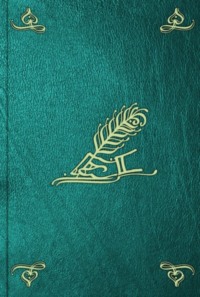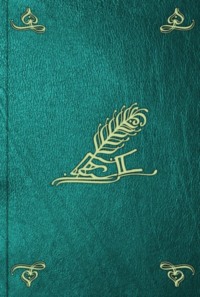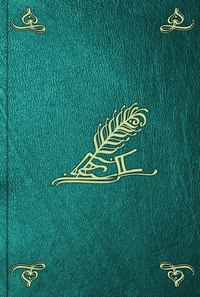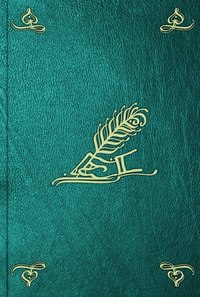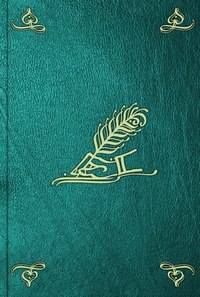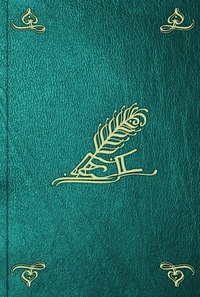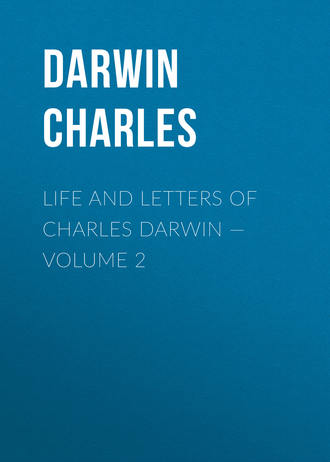 полная версия
полная версияLife and Letters of Charles Darwin — Volume 2
Yours very sincerely, C. DARWIN.
I will write soon again.
CHARLES DARWIN TO C. LYELL. Down, 22nd [December, 1859].
My dear Lyell, Thanks about "Bears" (See 'Origin,' edition i., page 184.), a word of il-omen to me.
I am too unwell to leave home, so shall not see you.
I am very glad of your remarks on Hooker. (Sir C. Lyell wrote to Sir J.D. Hooker, December 19, 1859 ('Life,' ii. page 327): "I have just finished the reading of your splendid Essay [the 'Flora of Australia'] on the origin of species, as illustrated by your wide botanical experience, and think it goes very far to raise the variety-making hypothesis to the rank of a theory, as accounting for the manner in which new species enter the world.") I have not yet got the essay. The parts which I read in sheets seemed to me grand, especially the generalization about the Australian flora itself. How superior to Robert Brown's celebrated essay! I have not seen Naudin's paper ('Revue Horticole,' 1852. See historical Sketch in the later editions of the 'Origin of Species.'), and shall not be able till I hunt the libraries. I am very anxious to see it. Decaisne seems to think he gives my whole theory. I do not know when I shall have time and strength to grapple with Hooker...
P.S. — I have heard from Sir W. Jardine (Jardine, Sir William, Bart., 1800-1874), was the son of Sir A. Jardine of Applegarth, Dumfriesshire. He was educated at Edinburgh, and succeeded to the title on his father's decease in 1821. He published, jointly with Mr. Prideaux, J. Selby, Sir Stamford Raffles, Dr. Horsfield, and other ornithologists, 'Illustrations of Ornithology,' and edited the 'Naturalist's Library,' in 40 volumes, which included the four branches: Mammalia, Ornithology, Ichnology, and Entomology. Of these 40 volumes 14 were written by himself. In 1836 he became editor of the 'Magazine of Zoology and Botany,' which, two years later, was transformed into 'Annals of Natural History,' but remained under his direction. For Bohn's Standard Library he edited White's 'Natural History of Selborne.' Sir W. Jardine was also joint editor of the 'Edinburgh Philosophical Journal,' and was author of 'British Salmonidae,' 'Ichthyology of Annandale,' 'Memoirs of the late Hugh Strickland,' 'Contributions to Ornithology,' 'Ornithological Synonyms,' etc. — (Taken from Ward, 'Men of the Reign,' and Cates, 'Dictionary of General Biography.'): his criticisms are quite unimportant; some of the Galapagos so-called species ought to be called varieties, which I fully expected; some of the sub-genera, thought to be wholly endemic, have been found on the Continent (not that he gives his authority), but I do not make out that the species are the same. His letter is brief and vague, but he says he will write again.
CHARLES DARWIN TO J.D. HOOKER. Down [23rd December, 1859].
My dear Hooker,
I received last night your 'Introduction,' for which very many thanks; I am surprised to see how big it is: I shall not be able to read it very soon. It was very good of you to send Naudin, for I was very curious to see it. I am surprised that Decaisne should say it was the same as mine. Naudin gives artificial selection, as well as a score of English writers, and when he says species were formed in the same manner, I thought the paper would certainly prove exactly the same as mine. But I cannot find one word like the struggle for existence and natural selection. On the contrary, he brings in his principle (page 103) of finality (which I do not understand), which, he says, with some authors is fatality, with others providence, and which adapts the forms of every being, and harmonises them all throughout nature.
He assumes like old geologists (who assumed that the forces of nature were formerly greater), that species were at first more plastic. His simile of tree and classification is like mine (and others), but he cannot, I think, have reflected much on the subject, otherwise he would see that genealogy by itself does not give classification; I declare I cannot see a MUCH closer approach to Wallace and me in Naudin than in Lamarck — we all agree in modification and descent. If I do not hear from you I will return the 'Revue' in a few days (with the cover). I dare say Lyell would be glad to see it. By the way, I will retain the volume till I hear whether I shall or not send it to Lyell. I should rather like Lyell to see this note, though it is foolish work sticking up for independence or priority.
Ever yours, C. DARWIN.
A. SEDGWICK (Rev. Adam Sedgwick, 1785-1873, Woodwardian Professor of Geology in the University of Cambridge.) TO CHARLES DARWIN. Cambridge, December 24th, [1859].
My dear Darwin,
I write to thank you for your work on the 'Origin of Species.' It came, I think, in the latter part of last week; but it MAY have come a few days sooner, and been overlooked among my book-parcels, which often remain unopened when I am lazy or busy with any work before me. So soon as I opened it I began to read it, and I finished it, after many interruptions, on Tuesday. Yesterday I was employed — 1st, in preparing for my lecture; 2ndly, in attending a meeting of my brother Fellows to discuss the final propositions of the Parliamentary Commissioners; 3rdly, in lecturing; 4thly, in hearing the conclusion of the discussion and the College reply, whereby, in conformity with my own wishes, we accepted the scheme of the Commissioners; 5thly, in dining with an old friend at Clare College; 6thly, in adjourning to the weekly meeting of the Ray Club, from which I returned at 10 P.M., dog-tired, and hardly able to climb my staircase. Lastly, in looking through the "Times" to see what was going on in the busy world.
I do not state this to fill space (though I believe that Nature does abhor a vacuum), but to prove that my reply and my thanks are sent to you by the earliest leisure I have, though that is but a very contracted opportunity. If I did not think you a good-tempered and truth-loving man, I should not tell you that (spite of the great knowledge, store of facts, capital views of the correlation of the various parts of organic nature, admirable hints about the diffusion, through wide regions of many related organic beings, etc., etc.) I have read your book with more pain than pleasure. Parts of it I admired greatly, parts I laughed at till my sides were almost sore; other parts I read with absolute sorrow, because I think them utterly false and grievously mischievous. You have DESERTED — after a start in that tra-road of all solid physical truth — the true method of induction, and started us in machinery as wild, I think, as Bishop Wilkins's locomotive that was to sail with us to the moon. Many of your wide conclusions are based upon assumptions which can neither be proved nor disproved, why then express them in the language and arrangement of philosophical induction? As to your grand principle — NATURAL SELECTION — what is it but a secondary consequence of supposed, or known, primary facts! Development is a better word, because more close to the cause of the fact? For you do not deny causation. I call (in the abstract) causation the will of God; and I can prove that He acts for the good of His creatures. He also acts by laws which we can study and comprehend. Acting by law, and under what is called final causes, comprehends, I think, your whole principle. You write of "natural selection" as if it were done curiously by the selecting agent. 'Tis but a consequence of the presupposed development, and the subsequent battle for life. This view of nature you have stated admirably, though admitted by all naturalists and denied by no one of common sense. We all admit development as a fact of history: but how came it about? Here, in language, and still more in logic, we are point-blank at issue. There is a moral or metaphysical part of nature as well a physical. A man who denies this is deep in the mire of folly. 'Tis the crown and glory of organic science that it DOES through FINAL CAUSE, link material and moral; and yet DOES NOT allow us to mingle them in our first conception of laws, and our classification of such laws, whether we consider one side of nature or the other. You have ignored this link; and, if I do not mistake your meaning, you have done your best in one or two pregnant cases to break it. Were it possible (which, thank God, it is not) to break it, humanity, in my mind, would suffer a damage that might brutalize it, and sink the human race into a lower grade of degradation than any into which it has fallen since its written records tell us of its history. Take the case of the bee-cells. If your development produced the successive modification of the bee and its cells (which no mortal can prove), final cause would stand good as the directing cause under which the successive generations acted and gradually improved. Passages in your book, like that to which I have alluded (and there are others almost as bad), greatly shocked my moral taste. I think, in speculating on organic descent, you OVER-state the evidence of geology; and that you UNDER-state it while you are talking of the broken links of your natural pedigree: but my paper is nearly done, and I must go to my lecture-room. Lastly, then, I greatly dislike the concluding chapter — not as a summary, for in that light it appears good — but I dislike it from the tone of triumphant confidence in which you appeal to the rising generation (in a tone I condemned in the author of the 'Vestiges') and prophesy of things not yet in the womb of time, nor (if we are to trust the accumulated experience of human sense and the inferences of its logic) ever likely to be found anywhere but in the fertile womb of man's imagination. And now to say a word about a son of a monkey and an old friend of yours: I am better, far better, than I was last year. I have been lecturing three days a week (formerly I gave six a week) without much fatigue, but I find by the loss of activity and memory, and of all productive powers, that my bodily frame is sinking slowly towards the earth. But I have visions of the future. They are as much a part of myself as my stomach and my heart, and these visions are to have their antitype in solid fruition of what is best and greatest. But on one condition only — that I humbly accept God's revelation of Himself both in his works and in His word, and do my best to act in conformity with that knowledge which He only can give me, and He only can sustain me in doing. If you and I do all this we shall meet in heaven.
I have written in a hurry, and in a spirit of brotherly love, therefore forgive any sentence you happen to dislike; and believe me, spite of any disagreement in some points of the deepest moral interest, your tru-hearted old friend,
A. SEDGWICK.
CHARLES DARWIN TO T.H. HUXLEY. Down, December 25th [1859].
My dear Huxley,
One part of your note has pleased me so much that I must thank you for it. Not only Sir H.H. [Holland], but several others, have attacked me about analogy leading to belief in one primordial CREATED form. ('Origin,' edition i. page 484. — "Therefore I should infer from analogy that probably all the organic beings which have ever lived on this earth have descended from some one primordial form, into which life was first breathed.") (By which I mean only that we know nothing as yet [of] how life originates.) I thought I was universally condemned on this head. But I answered that though perhaps it would have been more prudent not to have put it in, I would not strike it out, as it seemed to me probable, and I give it on no other grounds. You will see in your mind the kind of arguments which made me think it probable, and no one fact had so great an effect on me as your most curious remarks on the apparent homologies of the head of Vertebrata and Articulata.
You have done a real good turn in the Agency business ("My General Agent" was a sobriquet applied at this time by my father to Mr. Huxley.) (I never before heard of a hard-working, unpaid agent besides yourself), in talking with Sir H.H., for he will have great influence over many. He floored me from my ignorance about the bones of the ear, and I made a mental note to ask you what the facts were.
With hearty thanks and real admiration for your generous zeal for the subject.
Yours most truly, C. DARWIN.
You may smile about the care and precautions I have taken about my ugly MS. (Manuscript left with Mr. Huxley for his perusal.); it is not so much the value I set on them, but the remembrance of the intolerable labour — for instance, in tracing the history of the breeds of pigeons.
CHARLES DARWIN TO J.D. HOOKER. Down, 25th [December, 1859].
... I shall not write to Decaisne (With regard to Naudin's paper in the 'Revue Horticole,' 1852.); I have always had a strong feeling that no one had better defend his own priority. I cannot say that I am as indifferent to the subject as I ought to be, but one can avoid doing anything in consequence.
I do not believe one iota about your having assimilated any of my notions unconsciously. You have always done me more than justice. But I do think I did you a bad turn by getting you to read the old MS., as it must have checked your own original thoughts. There is one thing I am fully convinced of, that the future progress (which is the really important point) of the subject will have depended on really good and well-known workers, like yourself, Lyell, and Huxley, having taken up the subject, than on my own work. I see plainly it is this that strikes my no-scientific friends.
Last night I said to myself, I would just cut your Introduction, but would not begin to read, but I broke down, and had a good hour's read.
Farewell, yours affectionately, C. DARWIN.
CHARLES DARWIN TO J.D. HOOKER. December 28th, 1859.
... Have you seen the splendid essay and notice of my book in the "Times"? (December 26th.) I cannot avoid a strong suspicion that it is by Huxley; but I never heard that he wrote in the "Times". It will do grand service...
C. DARWIN TO T.H. HUXLEY. Down, December 28th [1859].
My dear Huxley,
Yesterday evening, when I read the "Times" of a previous day, I was amazed to find a splendid essay and review of me. Who can the author be? I am intensely curious. It included an eulogium of me which quite touched me, though I am not vain enough to think it all deserved. The author is a literary man, and German scholar. He has read my book very attentively; but, what is very remarkable, it seems that he is a profound naturalist. He knows my Barnacle-book, and appreciates it too highly. Lastly, he writes and thinks with quite uncommon force and clearness; and what is even still rarer, his writing is seasoned with most pleasant wit. We all laughed heartily over some of the sentences. I was charmed with those unreasonable mortals, who know anything, all thinking fit to range themselves on one side. (The reviewer proposes to pass by the orthodox view, according to which the phenomena of the organic world are "the immediate product of a creative fiat, and consequently are out of the domain of science altogether." And he does so "with less hesitation, as it so happens that those persons who are practically conversant with the facts of the case (plainly a considerable advantage) have always thought fit to range themselves" in the category of those holding "views which profess to rest on a scientific basis only, and therefore admit of being argued to their consequences.") Who can it be? Certainly I should have said that there was only one man in England who could have written this essay, and that YOU were the man. But I suppose I am wrong, and that there is some hidden genius of great calibre. For how could you influence Jupiter Olympius and make him give three and a half columns to pure science? The old fogies will think the world will come to an end. Well, whoever the man is, he has done great service to the cause, far more than by a dozen reviews in common periodicals. The grand way he soars above common religious prejudices, and the admission of such views into the "Times", I look at as of the highest importance, quite independently of the mere question of species. If you should happen to be ACQUAINTED with the author, for Heaven-sake tell me who he is?
My dear Huxley, yours most sincerely, C. DARWIN.
[It is impossible to give in a short space an adequate idea of Mr. Huxley's article in the "Times" of December 26. It is admirably planned, so as to claim for the 'Origin' a respectful hearing, and it abstains from anything like dogmatism in asserting the truth of the doctrines therein upheld. A few passages may be quoted: — "That this most ingenious hypothesis enables us to give a reason for many apparent anomalies in the distribution of living beings in time and space, and that it is not contradicted by the main phenomena of life and organisation, appear to us to be unquestionable." Mr. Huxley goes on to recommend to the readers of the 'Origin' a condition of "thatige Skepsis" — a state of "doubt which so loves truth that it neither dares rest in doubting, nor extinguish itself by unjustified belief." The final paragraph is in a strong contrast to Professor Sedgwick and his "ropes of bubbles" (see below). Mr. Huxley writes: "Mr. Darwin abhors mere speculation as nature abhors a vacuum. He is as greedy of cases and precedents as any constitutional lawyer, and all the principles he lays down are capable of being brought to the test of observation and experiment. The path he bids us follow professes to be not a mere airy track, fabricated of ideal cobwebs, but a solid and broad bridge of facts. If it be so, it will carry us safely over many a chasm in our knowledge, and lead us to a region free from the snares of those fascinating but barren virgins, the Final Causes, against whom a high authority has so justly warned us."
There can be no doubt that this powerful essay, appearing as it did in the leading daily Journal, must have had a strong influence on the reading public. Mr. Huxley allows me to quote from a letter an account of the happy chance that threw into his hands the opportunity of writing it.
"The 'Origin' was sent to Mr. Lucas, one of the staff of the "Times" writers at that day, in what I suppose was the ordinary course of business. Mr. Lucas, though an excellent journalist, and, at a later period, editor of 'Once a Week,' was as innocent of any knowledge of science as a babe, and bewailed himself to an acquaintance on having to deal with such a book. Whereupon he was recommended to ask me to get him out of his difficulty, and he applied to me accordingly, explaining, however, that it would be necessary for him formally to adopt anything I might be disposed to write, by prefacing it with two or three paragraphs of his own.
"I was too anxious to seize upon the opportunity thus offered of giving the book a fair chance with the multitudinous readers of the "Times" to make any difficulty about conditions; and being then very full of the subject, I wrote the article faster, I think, than I ever wrote anything in my life, and sent it to Mr. Lucas, who duly prefixed his opening sentences.
"When the article appeared, there was much speculation as to its authorship. The secret leaked out in time, as all secrets will, but not by my aid; and then I used to derive a good deal of innocent amusement from the vehement assertions of some of my more acute friends, that they knew it was mine from the first paragraph!
"As the "Times" some years since, referred to my connection with the review, I suppose there will be no breach of confidence in the publication of this little history, if you think it worth the space it will occupy."]
CHAPTER 2.II. — THE 'ORIGIN OF SPECIES' (continued)
1860[I extract a few entries from my father's Diary: —
"January 7th. The second edition, 3000 copies, of 'Origin' was published."
"May 22nd. The first edition of 'Origin' in the United States was 2500 copies."
My father has here noted down the sums received for the 'Origin.'
First Edition...180 pounds Second Edition...636 pounds 13 shillings 4 pence
Total......816 pounds 13 shillings 4 pence.
After the publication of the second edition he began at once, on January 9th, looking over his materials for the 'Variation of Animals and Plants;' the only other work of the year was on Drosera.
He was at Down during the whole of this year, except for a visit to Dr. Lane's Water-cure Establishment at Sudbrooke, and in June, and for visits to Miss Elizabeth Wedgwood's house at Hartfield, in Sussex (July), and to Eastbourne, September 22 to November 16.]
CHARLES DARWIN TO J.D. HOOKER. Down, January 3rd [1860].
My dear Hooker,
I have finished your Essay. ('Australian Flora.') As probably you would like to hear my opinion, though a non-botanist, I will give it without any exaggeration. To my judgment it is by far the grandest and most interesting essay, on subjects of the nature discussed, I have ever read. You know how I admired your former essays, but this seems to me far grander. I like all the part after page xxvi better than the first part, probably because newer to me. I dare say you will demur to this, for I think every author likes the most speculative parts of his own productions. How superior your essay is to the famous one of Brown (here will be sneer 1st from you). You have made all your conclusions so admirably clear, that it would be no use at all to be a botanist (sneer No. 2). By Jove, it would do harm to affix any idea to the long names of outlandish orders. One can look at your conclusions with the philosophic abstraction with which a mathematician looks at his a times x + the square root of z squared, etc. etc. I hardly know which parts have interested me most; for over and over again I exclaimed, "this beats all." The general comparison of the Flora of Australia with the rest of the world, strikes me (as before) as extremely original, good, and suggestive of many reflections.
... The invading Indian Flora is very interesting, but I think the fact you mention towards the close of the essay — that the Indian vegetation, in contradistinction to the Malayan vegetation, is found in low and level parts of the Malay Islands, GREATLY lessens the difficulty which at first (page 1) seemed so great. There is nothing like one's own hobby-horse. I suspect it is the same case as of glacial migration, and of naturalised production — of production of greater area conquering those of lesser; of course the Indian forms would have a greater difficulty in seizing on the cool parts of Australia. I demur to your remarks (page 1), as not "conceiving anything in soil, climate, or vegetation of India," which could stop the introduction of Australian plants. Towards the close of the essay (page civ), you have admirable remarks on our profound ignorance of the cause of possible naturalisation or introduction; I would answer page 1, by a later page, viz. page civ.
Your contrast of the south-west and south-east corners is one of the most wonderful cases I ever heard of... You show the case with wonderful force. Your discussion on mixed invaders of the south-east corner (and of New Zealand) is as curious and intricate a problem as of the races of men in Britain. Your remark on mixed invading Flora keeping down or destroying an original Flora, which was richer in number of species, strikes me as EMINENTLY NEW AND IMPORTANT. I am not sure whether to me the discussion on the New Zealand Flora is not even more instructive. I cannot too much admire both. But it will require a long time to suck in all the facts. Your case of the largest Australian orders having none, or very few, species in New Zealand, is truly marvellous. Anyhow, you have now DEMONSTRATED (together with no mammals in New Zealand) (bitter sneer No. 3), that New Zealand has never been continuously, or even nearly continuously, united by land to Australia!! At page lxxxix, is the only sentence (on this subject) in the whole essay at which I am much inclined to quarrel, viz. that no theory of trans-oceanic migration can explain, etc. etc. Now I maintain against all the world, that no man knows anything about the power of trans-oceanic migration. You do not know whether or not the absent orders have seeds which are killed by sea-water, like almost all Leguminosae, and like another order which I forget. Birds do not migrate from Australia to New Zealand, and therefore floatation SEEMS the only possible means; but yet I maintain that we do not know enough to argue on the question, especially as we do not know the main fact whether the seeds of Australian orders are killed by sea-water.



